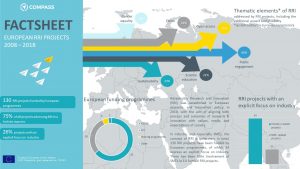Project Acronym: FaRInn
Project Title: Facilitating Responsible Innovation in SEE countries
Funding Programme: Interreg
Description: The main objective of "FaRInn - Facilitating Responsible Innovation in SEE countries" is to enhance framework conditions and pave the way for a responsible innovation model in South East Europe, which respects the principles of sustainability, social responsibility and better quality of life. Responsible Innovation is a "transparent, interactive process by which societal actors and innovators interact and collaborate, aiming to ethical acceptability, sustainability and societal desirability of innovations." (European Commission 2010). The concept has gained credibility over recent years as the negative consequences of growth have shown that it is not only important to innovate, but also to innovate responsibly. However, in Europe, particularly the SEE area, this increased theoretical acceptance has not been matched by related policy models or initiatives. In general, current day development models do not recognise the potential economic and societal benefits of responsibility. Indeed, in times of economic difficulty, actions inevitably return to short term cost cutting measures. The challenge is to show the advantages that enterprises and the community at large can gain from responsible innovation and to design and test comprehensive models to do so. FaRInn goes to the heart of this problem. FaRInn proposes a double sided solution of new governance mechanisms, strengthening the capacity of institutions to design and develop responsible innovation strategies, and of awareness raising among a public that should be ever more informed of and involved in public policy making. FaRInn is presented on the priority Facilitation of Innovation and Entrepreneurship, as it directly focuses on innovation models that respect the principles of sustainability, social responsibility and better quality of life. FaRInn works within AoI 1.3 to enhance identified framework conditions and lay a path for responsible innovation, particularly considering: accountability; transparency; low environmental impact; health and safety; work conditions; R&D investment and life-long learning; risk management; intergenerational fairness. FaRInn involves a series of innovation actors, both as partners and stakeholders. The 8 partners, covering 7 of the 16 SEE countries, are local and regional decision makers, local and regional development agencies, 1 university and 1 chamber of commerce. Each involves (through Local Steering Committees) a group of stakeholders that represent key elements of the innovation process. In order to achieve project objectives, FaRInn is structured into 4 integrated work packages (in addition to the Preparation phase): - WP1 Transnational Project and Financial Management (coordinated by CISE, 24 moths): this WP ensures effective day to day administrative and financial management (Action 1.1), monitoring and evaluation (Action 1.2) and efficient project closure at administrative and financial level (Action 1.3). - WP2 Communication Activities (coordinated by RCL, 24 moths): this WP ensures internal communication among partners (Action 2.1), external communication both to involve target groups (action 2.2) and to raise awareness among the general public and relevant institutions at local, national and European level (action 2.3). - WP3 Definition, Analysis and Operational Planning (coordinated by SZTE, 14 months): exchange in this WP leads to a definition of framework conditions and necessary elements of responsible innovation (Action 3.1), followed by an in-depth local SWOT analysis on these characteristics (Action 3.2) and the design of a work plan for the testing phase during WP4 (Action 3.3). - WP4 Application and Testing of Responsible Innovation Models (coordinated by NAR, 9 months): sees the application of lessons learned during the project at local level (Action 4.1), after which each partner develops an action plan for activities to be implemented after project closure and a joint action plan is developed at project level.








